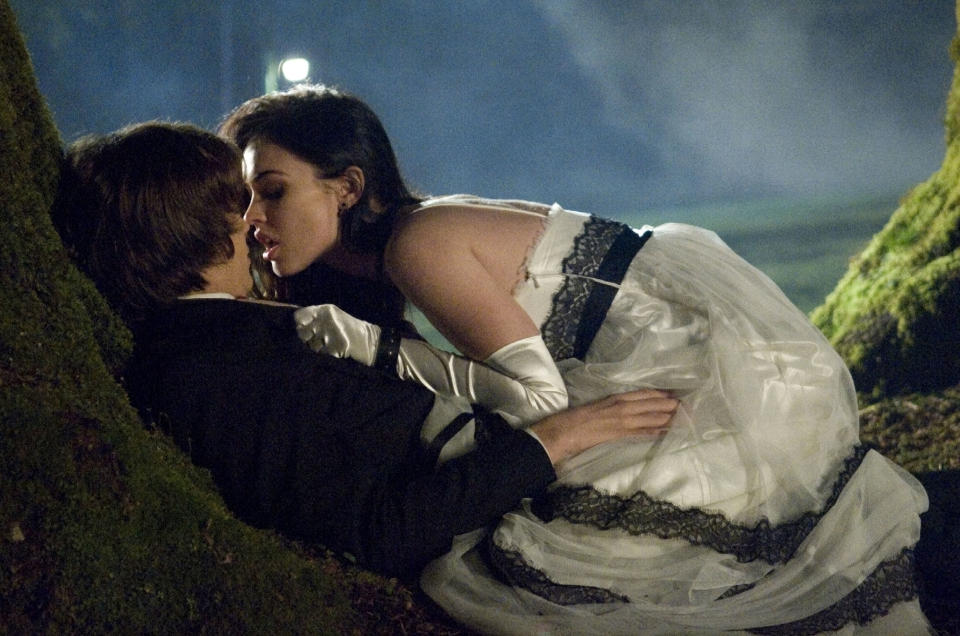Diablo Cody Is Back with Her Special Brand of Subversive Teen Sex Comedy — with a Message

[Editor’s note: The following article contains spoilers for “Lisa Frankenstein,” “Jennifer’s Body,” and “Young Adult.”]
Sometimes rage is the only way for a woman to get what she wants — especially if she’s a teenage girl with nothing else on her side. And no one channels that rage into movies better than screenwriter Diablo Cody.
More from IndieWire
The latest Cody film has all the signature requirements behind the Oscar-winning screenwriter’s scripts: Billed by Focus Features as “a coming of RAGE love story,” the teen-centric, not quite rom-com hinges on the sexual awakening and empowerment of a high school senior (Kathryn Newton) who seeks solace from a centuries-old corpse (Cole Sprouse) after grieving death and coping with an assault.
“Lisa Frankenstein” is just the most recent female-fronted original horror-dark comedy from Cody, who penned the iconic “Jennifer’s Body” and recently told Deadline that “Lisa Frankenstein” exists in the same universe as the Megan Fox and Amanda Seyfried two-hander.
The declaration comes on the heels of Cody voicing her hopes for a “Jennifer’s Body” sequel, adding that it’s “hard to get things made these days.” Prior to “Lisa Frankenstein,” Cody hadn’t written a script since 2018’s “Tully,” which was produced by lead star Charlize Theron, whom Cody had previously collaborated with on “Young Adult.” (To note, Cody’s “Juno” helmer Jason Reitman also directed “Tully.”)
Cody went viral for winning the Oscar in 2007 for Best Original Screenplay for “Juno” and openly talking about her former work as an exotic dancer for blog fodder. And in Cody’s films, sex — whether used as a tool for escape, manipulation, or pleasure — is front and center in a nuanced, and usually darkly comedic, way.

The 1989-set “Lisa Frankenstein” charts a similar course to “Jennifer’s Body,” with a teen’s sexual awakening coming at the hands (literally) of an unwanted experience. Newton stars as the titular traumatized teen who is grieving her mother’s death; she is drugged and assaulted at a high school party, leading her to befriend a reanimated corpse (Sprouse) that is brought back to life after she wishes she too were dead amid a thunderstorm.
Jennifer (Fox) in “Jennifer’s Body” lies about being a virgin to a wannabe rock star (Adam Brody), who then murders her in a sacrifice to achieve fame; since Jennifer was in fact sexually active pre-sacrifice, the plan backfires and she becomes a half-dead vessel that needs to feast on men, luring them to their deaths by weaponizing her sexuality only to eat them like raw chicken.
Cody told IndieWire that “Lisa Frankenstein” was a direct result of the public reclamation of “Jennifer’s Body,” saying, “If people hadn’t rediscovered ‘Jennifer’s Body,’ I would not have written ‘Lisa Frankenstein.’ With that whole area, that genre, I kind of felt unwelcome in it, because I had flopped so hard on my last attempt.”
The “Under the Skin” parallel in Cody’s work continues with “Lisa Frankenstein,” as Lisa’s first murder (well, the first one she spearheads at least) is the boy who took advantage of her at the party. Screenwriter Cody revealed to IndieWire that it was an essential plot point of the film to tell Lisa’s hero journey.
“One element that I absolutely had to have in this movie is, I wanted her to be able to reclaim the hand of the man who had sexually assaulted her and to repurpose it for her pleasure,” Cody said, “which she does, even though it’s not as explicitly stated in the movie as it was in the original draft.”

Lisa sews the hand of her abuser onto the corpse she’s romantically interested in so he can have use all of his limbs. She then uses a tanning bed to have him regain feeling in the newfound hand, something which he then uses upon their eventual hook-up.
“I mean, you know me, there’s definitely a hard-R version of that that exists in my mind,” Cody said of just how much that hand was put to use. “Lisa Frankenstein” director Zelda Williams confirmed that the rated-R version was filmed but just edited out to maintain a PG-13 rating and appeal to teens in theaters.
Later in the film, Lisa salvages the penis of her murdered crush to fully consummate her undead romance.
The “rage” concept, as propelled by the Focus Features’ marketing campaign for the movie, echoes the unique blend of melancholy and empowered bodily autonomy. Cody’s other leading ladies in “Young Adult” and “Tully,” both played by Theron, use sex as forms of escape or validation. Whereas “Jennifer’s Body” has a queer-laced crux with Seyfried’s Needy obsessing over best friend Jennifer, the “monster” of the half-possessed would-be prom queen isn’t a monster at all: Instead, it’s all the leering boys Jennifer can either dupe or take revenge on.
Similarly, “Lisa Frankenstein” positions Lisa as the “mad scientist” á la the famed Mary Shelley monster origin story. Yet, with a twist ending, the film becomes more “Easy A” meets “True Romance” than a gender-swapped “Pygmalion.”
Cody, who was originally attached to pen the first “Barbie” iteration at Sony, addressed the trend of greenlighting particular types of stories centered around idealized female protagonists as objects created by men, much like in the vein of “Poor Things” and to an extent, the lore of “Barbie” itself.

“It was funny to me how the whole Frankenstein narrative was co-opted in the ‘80s by movies like ‘Weird Science’ where they were like, ‘What if we could create the perfect woman?,’” Cody told Empire magazine in 2023. “You see that theme across genres, and I felt like nobody was making a ‘building a man’ movie except ‘The Rocky Horror Picture Show,’ which I love, and which we reference in the film.”
Cody later told IndieWire that she did in fact see “Poor Things,” and believes that the Yorgos Lanthimos Oscar-nominated feature is just the latest gender-flipped iteration in a long line of “Frankenstein” movies, with Guillermo del Toro’s “Frankenstein” starring Jacob Elordi and Maggie Gyllenhaal’s “Bride of Frankenstein” with Christian Bale and Jessie Buckley also in the works.
“We’re in a Frankenstein moment,” Cody said to IndieWire’s Kate Erbland. “This happens in Hollywood, where there’s an idea that is floating in the creative hive mind and it’s never deliberate, but it’s interesting. The idea of creating life is never going to get old, and I’m also just never sure it ever really went away. I’m delighted to be on trend for once. Usually I’m either ahead or behind!”

However, Cody herself has built a trend (and arguably, a brand) by capturing a moment in women’s lives where they can either embrace the aforementioned rage or shy away from it. Men, for that matter, are irrelevant, or serve solely as catalysts to such a realization.
“Jennifer’s Body” shows two routes for women, as embodied by Fox and Seyfried’s respective characters. The film is intrinsically tied to Cody’s feature debut “Juno,” as Cody even said back in 2007 to Entertainment Weekly that “Jennifer’s Body” was “‘Juno’ but with cannibalism and evisceration.”
And the multifaceted takes of the societal tutelage imposed on women is found in a slew of Cody’s female characters, even those who aren’t teens. Cody previously called her Showtime series “The United States of Tara,” which starred Toni Collete as a woman with multiple personalities, a direct “reaction to the multitude of roles woman are forced to play in society,” citing the show’s premise about “typical woman has to be this, that, and the other, actually embodying different people in order to survive” in an interview with News Blaze.

To IndieWire in 2011, Cody shared that “Young Adult” was written as a response to journalists asking her why Cody was “obsessed with writing about teenagers.” In the film, Theron plays a novelist who only focuses on YA books as a coping mechanism for peaking in high school.
“What if I’m actually just living vicariously through these characters and I’m just a stunted adult who’s immature and who hasn’t progressed passed an adolescent stage of life?,” Cody wondered about herself, leading her to create the film.
Despite continuing to pen teen-centric films like “Lisa Frankenstein,” there is much to be said about staying within that age range for a female protagonist, especially one who has a realization that adulthood and social norms are more toxic than a Victorian corpse. “Lisa Frankenstein” may be a unique taste for some, a campy frothy ’80s-inspired film for others, and a new Cody masterpiece for most, but the feature proves that there is nothing dead about the feminist messages found in Cody’s almost two-decade career in Hollywood.
Best of IndieWire
Where to Watch This Week's New Movies, Including 'Argylle' and 'How to Have Sex'
Christopher Nolan's Favorite Movies: 40 Films the Director Wants You to See
Sign up for Indiewire's Newsletter. For the latest news, follow us on Facebook, Twitter, and Instagram.

 Yahoo News
Yahoo News 
